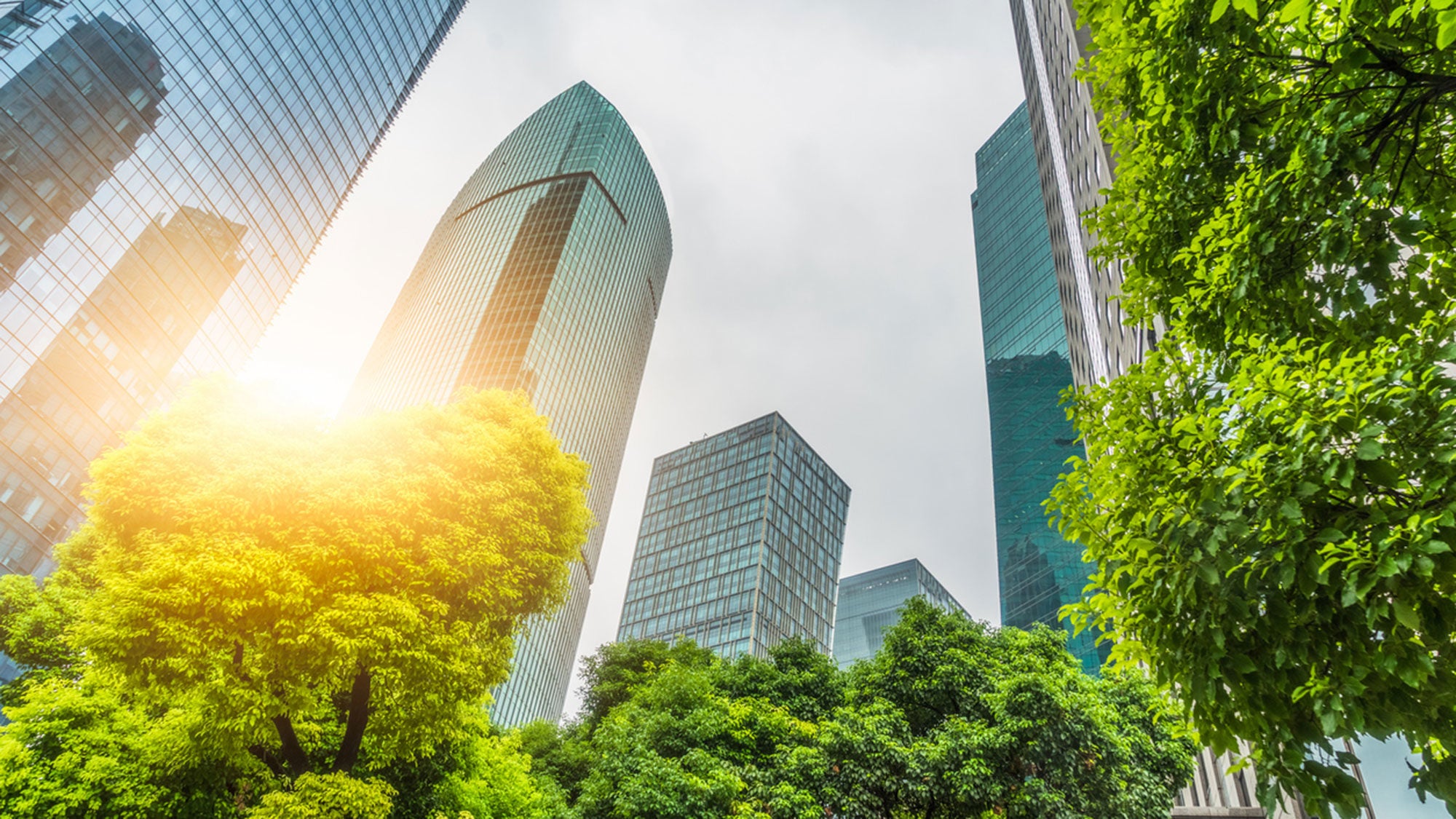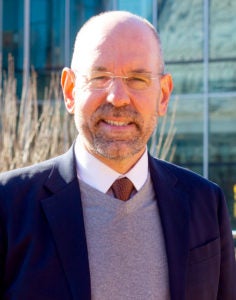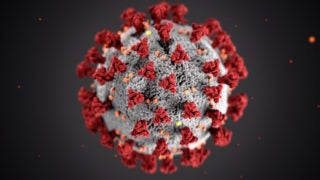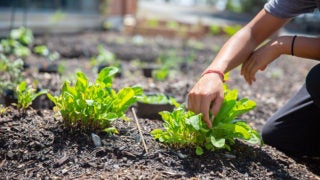
Title: Experts Ponder Effect of COVID-19 on Future of Sustainability and the Environment
With a commitment to sustainability and the environment rooted in its Jesuit values, Georgetown’s experts in science, history, international affairs and health say COVID-19 has not only deeply impacted our physical and financial well-being, but also the world’s carbon footprint.
The experts below also believe the pandemic, while devastating, also presents numerous opportunities for long-term environmental protection strategies.
Peter Marra, director of the Georgetown Environment Initiative (GEI) and the Laudato Si’ Professor of Biology and the Environment
 Noting how Pope Francis’ 2015 encyclical on the environment urged the world to care for its common home, Marra says it’s essential to continue to engage around the complex issues of the environment and sustainability to advance the common good even as we weather a global pandemic.
Noting how Pope Francis’ 2015 encyclical on the environment urged the world to care for its common home, Marra says it’s essential to continue to engage around the complex issues of the environment and sustainability to advance the common good even as we weather a global pandemic.
“With a reduction in planes, trains and automobiles moving around on the planet, there has definitely been significant global reductions in various atmospheric pollutants – up to 30%,” says Marra, also a professor in the McCourt School of Public Policy. “We have seen these responses before in times of crisis and human suffering – after the 2008 recession and 9/11. The problem is that these responses have in the past been temporary.”
The conservationist believes efforts to revive global economies may run the danger of eroding environmental gains countries secured before the current pandemic.
“We must use this as an opportunity to rethink our day-to-day practices, both at an individual and institutional level,” he adds. “Maybe we don’t need to travel as much. Can we telework more? Maybe go to fewer conferences? Are there other practices we’re doing now that make us more sustainable that we can make permanent? These are really important questions.”
Like Marra, several other Georgetown scholars have noticed environmental improvements and suggest ways we can preserve the planet and humankind.
Laura Anderko, Robert and Kathleen Scanlon Endowed Chair in Values Based Health Care
 Anderko notes that satellite photos of Wuhan, China – taken by NASA in February – revealed a significant decrease in air pollution compared to the previous month.
Anderko notes that satellite photos of Wuhan, China – taken by NASA in February – revealed a significant decrease in air pollution compared to the previous month.
“It is estimated that over 700,000 lives will be saved in Wuhan alone as a result of better air quality,” says Anderko, director of the Mid-Atlantic Center for Children’s Health and the Environment. “We are seeing reductions in air pollution in the U.S. as well. During these times of profound suffering, that we hope never to repeat, there are abundant opportunities in which we can explore health improvements from environmental protections, including changes in our automobile-dominated culture.”
The School of Nursing & Health Studies professor’s current research includes testing air quality at Washington, DC schools.
“We will be analyzing the impacts of less traffic and its impact on the microclimates at schools within the District – determining whether getting ‘back to normal’ will result in higher levels of air pollution near our school yards,” Anderko says. “Health professionals should seize this moment to advance cleaner, healthier ways of living.”
Dagomar Degroot, associate professor of history
 A roughly 4% global reduction in carbon dioxide (CO2) emissions is anticipated for 2020, according to Degroot.
A roughly 4% global reduction in carbon dioxide (CO2) emissions is anticipated for 2020, according to Degroot.
“That’s far and away the largest-ever recorded decline, equating to 1.6 billion fewer tons of CO2 in the atmosphere,” he explains. “It is good news that comes at great cost, of course.”
The environmental historian says we would need to have a 6% annual decline to limit global warming to 2.7 degrees Fahrenheit above the late 20th century average global temperature.
“Climate change, pollution, deforestation and pandemics – it’s all part and parcel of the Anthropocene, the present era of unsustainable exploitation and destruction of Earth’s resources,” Degroot says. “To the extent that the pandemic causes us to change some of our most destructive relationships with our biosphere, it will have done a modicum of good. It certainly is showing us that scientific predictions can suddenly come true.”
The Georgetown professor says the pandemic is not only a devastating, largely preventable tragedy for the world, but it also has stalled the momentum of a rising climate change protest movement. And It has further indebted countries that will need massive public investment to begin the transition to a low-carbon economy, he says.
While Degroot notes the setbacks to combat climate change, he’s encouraged by the way citizens have galvanized during this difficult time.
“What I communicate to students and will emphasize going forward is today’s extraordinary example of what we can all accomplish when faced with an imminent threat,” he says. “In country after country, citizens have changed their daily lives at tremendous cost, while doctors and nurses, delivery personnel and factory workers, supermarket employees and police officers place their lives on the line for the common good. All this – rightfully – for a pandemic that may have a less than 1% mortality rate.”
“If we can undertake such unprecedented action now,” he adds, “I am absolutely certain that we can do it again, to overcome the even greater danger of a crumbling environment.”
Joanna Lewis, associate professor of energy and environment and director of the Science, Technology and International Affairs Program (STIA)
 “In the face of the economic slowdown, not all energy industries are being affected equally,” says Lewis, a professor in Georgetown’s School of Foreign Service. “Coal power plants are running less due to lower demand and that could lead to their early retirement. Fossil fuel companies are struggling with low oil and gas prices. And while clean energy industries are also experiencing slowing demand, they are still growing.”
“In the face of the economic slowdown, not all energy industries are being affected equally,” says Lewis, a professor in Georgetown’s School of Foreign Service. “Coal power plants are running less due to lower demand and that could lead to their early retirement. Fossil fuel companies are struggling with low oil and gas prices. And while clean energy industries are also experiencing slowing demand, they are still growing.”
She says this trend means that renewable energy likely will account for over a fifth of U.S. electricity consumption this year – the largest share yet.
But Lewis says it can be a challenge to continue important sustainability efforts amid an economy heavily impacted by COVID-19.
“We are already seeing pressure placed on environmental regulations because they are seen as potentially hampering economic growth,” she says. “But there does not need to be a tradeoff between economic growth and environmental protection.”
Lewis says the economic stimulus measures being discussed around the world present an opportunity for countries to invest in clean energy technologies.
“All countries should be thinking strategically about how the record-level of stimulus support being proposed by policymakers can be used to direct investments toward lower carbon technologies,” she adds.
John McNeill, University Professor of history, School of Foreign Service
 Though short-term environmental effects of the pandemic are many, McNeill believes the reduction in air pollution is temporary and that in two years former levels of pollution will return.
Though short-term environmental effects of the pandemic are many, McNeill believes the reduction in air pollution is temporary and that in two years former levels of pollution will return.
The environmental historian also says, however, that the regulation of wildlife trade and habitat destruction or modification might be one possible exception.
“At the moment, the genomic analysis of SARS CoV-2 suggests it originated with bats, like many viruses, and was passed to humans via an intermediary species, perhaps pangolins,” he explains.
Pangolins and civet cats – both indigenous to Asia and Africa and enjoyed as delicacies or believed to hold medicinal properties – have been linked to COVID-19 as well as the 2003 SARS outbreak.
“One way to reduce the frequency with which viruses circulate and become human pathogens would be to reduce the trade in wildlife,” McNeill says. “Another would be to reduce the habitat pressure on wildlife of all sorts, but especially bats and rodents, as they seem to be the likeliest sources of unfamiliar human pathogens.”
Uwe Brandes, professor of the practice and faculty director of the Urban and Regional Planning Program
 Brandes, says the impact of the global response to COVID-19 may have a complex series of impacts on both the natural and built environment, but the most immediate impact is a growing awareness of how individuals relate to their communities.
Brandes, says the impact of the global response to COVID-19 may have a complex series of impacts on both the natural and built environment, but the most immediate impact is a growing awareness of how individuals relate to their communities.
We have become highly sensitized to the potential impact we have as individuals on the health of others, to our dependence on community health systems and to the supply chains that are our lifelines,” says Brandes, also faculty director of the Georgetown Global Cities Initiative. “The collective awareness generated by the pandemic will help us make better long-term decisions regarding what we deem sustainable urban infrastructure and how we value the consumption and protection of natural systems.”

